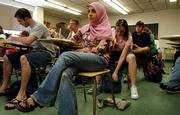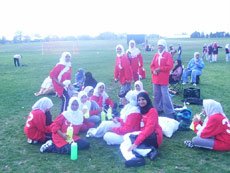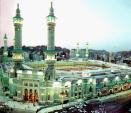 Finally, loans acceptable to Muslims become more commonCultural challenge: How to buy a house and observe ban on interest-bearing loans.
Finally, loans acceptable to Muslims become more commonCultural challenge: How to buy a house and observe ban on interest-bearing loans.
Sunday, April 23, 2006
By Chinki Sinha
Contributing writer
It took A. Ali at least six years to get the right kind of loan to buy a house. It wasn't because his credit score was bad. It was his faith.
Islam prohibits Muslims from dealing in conventional credit and taking or giving Riba, or interest, in any form. So, Ali kept paying rent until HSBC introduced Shariat-based loans in New York in 2002.
"We were renting. Our rent was much more 25 (percent) to 30 percent more than the regular mortgage, if we had taken it. But we waited for many years," said Ali. "It was like throwing money down the drain."
Ali moved to Syracuse in 1994. At the time, there were no institutions in New York that provided Islamic finance products based on co-ownership of property.
The Quran explicitly says that one who takes interest income is at war with Allah. It is as important as Zakat, or charity, which is mandatory, said Imam Taqiuddin Ahmed, the director of the Islamic Society of Central New York, 925 Comstock Ave.
"It is a sin. It is very, very serious," he said.
Ahmed provides counseling to Muslims who are planning to buy a house and directs them to go to institutions that have Islamic financing options. If there are none available, he directs them to keep paying rent.
"There is no ground for you to buy on interest. When it is the matter of life and death, then we allow," he said, giving an example of how he would allow a Muslim to eat pork, which is considered Haram, or sin, if there is nothing else available. "But eat little, only to keep yourself alive, and then search for other options," he said.
The same, he said, applies in the case of a loan.
The Quran made Riba unacceptable to provide for fairness in transactions and to avoid loan-sharking. But in the modern world, it means rejecting anything that promises a guaranteed return, including mortgages, credit cards and stocks.
HSBC introduced Islamic home finance products in the state in 2002.
American Finance House provides only finance products based on the Islamic religious law. It has branches in 33 states, but none in New York.
Guidance Financial Group started in Virginia in April 2002 and has now has a presence in 19 states, including New York, where it launched its products in 2003. The group was not the first to introduce Shariat-based financing, but it is the leader in home financing, said Hussam Qutub, director of communications for the organization.
"Many people are renting. They are not owning. Home-ownership is the most important purchase. These people are deferring," he said.
Here's how it works: The bank and the home buyer establish a joint-ownership of the property. In time, the individual buys out the bank's share through incremental monthly payments over a long period.
Akbar Muhammad, who lives in Syracuse, is in the process of buying a house and has approached Guidance Financial Group.
"Guidance is Islamic. We chose them. I had been waiting for years. I don't want to continue in these small places and pay rent," he said.
Some think Islamic banking is ideal for consumers because it protects them from the uncertainties of the market and lays emphasis on risk-sharing.
"The lower the interest, the better it is for the economy. The people will benefit," said Ahmed, who said that United States is waking up to the concept of religious banking. "I see it is growing. Twenty years ago, nobody would talk about it. Ten years ago, there were no special organizations doing this. The situation has changed now."
"There is a huge Muslim population. It is important to attract customers," said Yildray Yildirim, assistant professor in the finance department at Syracuse University's Martin J. Whitman School of Management.
"We know the demand is there. The Muslim population is the fastest-growing. It is around 6 to 8 million now," said Qutub.
Preserving one's religious beliefs, while surviving in a competitive capitalistic economy, can be difficult. It is also difficult because of limited availability of Islamic products. So, many Muslims are divided on the issue of Islamic banking.
Samina Masood, who lives in Syracuse, said it is not a practical approach.
"Unfortunately, living as a minority we become rigid. It becomes a thing to show that we are unique," she said. "You have to be open, otherwise it becomes difficult."
But Islamic products are available in most states. Many banks such as Citibank and HSBC and other smaller organizations, such as MSI Financial Services, an Islamic financial institution in Houston, American Finance House, headquartered in Pasadena, Calif., and Guidance Financial Group that is based in Virginia are venturing into Islamic financing and have developed products that are approved by scholars and regulators and appeal to the Muslim community.
The Shariat also limits the kinds of investments that these banks can make. The law prohibits putting money in the liquor industry or pornography, for example.
"It is not a walk in the park. It is challenging. It is a young industry," said Qutub.
What works for these banks and organizations is religion. People who take religion seriously do not go to regular banks or buy regular products. That's the market these institutions target, Qutub said.
Copyright 2006 syracuse.com. All Rights Reserved.




























